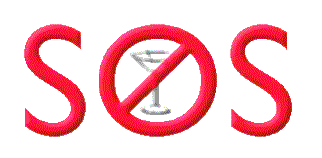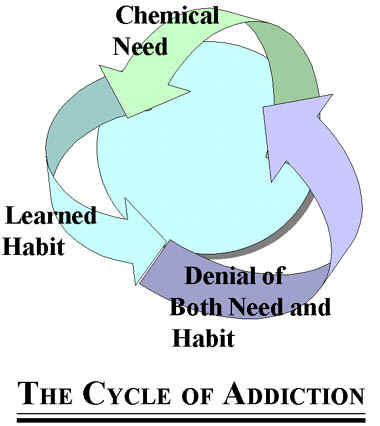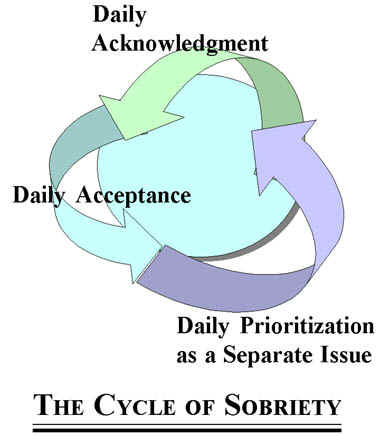
Save Our Selves
Part of the World Wide SOS Family
|
|
|
Home______
SOS Dallas Guide to Starting a Meeting SOS Behind Bars Guide to Starting a Meeting An SOS Approach to eating Disorders |
Your First 30 Days
Your First Thirty Days...... are very important. Both your mind and body are going through a significant transition; you are, in effect, reclaiming your life. Although addiction goes on "automatic pilot," sobriety does not, and must therefore, be made your daily priority. You are not alone-many others have walked, and are now walking, this same path. We offer the following suggestions in an effort to assist you in a wonderful new adventure-sobriety. We define sobriety as the priority of abstaining from alcohol and all other mind-altering drugs. It has been said by many that in early sobriety, things first get real, then they get real different. Reality is indeed a different experience; but it need not he overwhelming. General Principles of SOSAll those who sincerely seek sobriety are welcome as members in any SOS Group. SOS is not a spin-off of any religious or secular group. There is no hidden agenda, as SOS is concerned with achieving and maintaining sobriety (abstinence). SOS seeks only to promote sobriety amongst those who suffer from addictions. As a group, SOS has no opinion on outside matters and does not wish to become entangled in outside controversy. Although sobriety is an individual responsibility, life does not have to be faced alone. The support of other alcoholics and addicts is a vital adjunct to recovery. In SOS, members share experiences, insights, information, strength, and encouragement in friendly, honest, anonymous, and supportive group meetings. To avoid unnecessary entanglements, each SOS group is self-supporting through contributions from its members and refuses outside support. Sobriety is the number one priority in a recovering person's life. As such, he or she must abstain from all drugs or alcohol. Honest, clear, and direct communication of feelings, thoughts, and knowledge aids in recovery and in choosing nondestructive, non-delusional, and rational approaches to living sober and rewarding lives. As knowledge of addiction might cause a person harm or embarrassment in the outside world, SOS guards the anonymity of its membership and the contents of its discussions from those not within the group. SOS encourages the scientific study of addiction in all its aspects. SOS does not limit its outlook to one area of knowledge or theory of addiction.
Suggested Guidelines for Sobriety(These guidelines appear in How To Stay Sober)
Things To Do:
Recommended Reading:How To Stay Sober: Recovery without Religion by James Christopher (Prometheus Books, 1988). $20.95 Unhooked: Staying Sober and Drug Free by James Christopher (Prometheus Books, 1989). $18.95 SOS Sobriety: The Proven Alternative to 12-Step Programs by James Christopher (Prometheus Books, 1992). $18.95 Prices include shipping and handling. You may order the above three books through the SOS Clearinghouse. Also Recommended:Under the Influence by Dr. James Milam and Katherine Ketcham (Bantam Books). Feeling Good: The New Mood Therapy by David D. Burns, M.D. (Signet Books). The Natural History of Alcoholism: Causes, Patterns and Paths to Recovery by Dr. George E. Vailland (Harvard University Press). Alcohol and the Addictive Brain by Kenneth Blum, Ph. D. in collaboration with James E. Payne (Macmillan Publishing) Many Roads, One Journey: Moving Beyond the 12-Steps by Charlotte Davis Kasl, Ph. D. (Harper Collins) The Cycle of AddictionThe Sobriety Priority approach for achieving and maintaining freedom from alcohol and other mind-altering drugs is a cognitive strategy. It can be applied, on a daily basis, as long as one lives, to prevent relapse. The Sobriety Priority approach respects the power of "nature" (genetic inheritance, physiological constitution) and of "nurture" (learned habit, behaviors, and associations)by showing how to achieve the initial arrest of cellular addiction and stave off the chronic habits that result from this addiction. The "cycle of addiction" contains three debilitating elements: chemical need (at the physiological cellular level), learned habit (chronic drinking/using behavior and associations), and denial of both need and habit. The cycle of alcohol addiction usually develops over a period of years. Cycles have been found to be much shorter with other drugs, especially cocaine. In all cases, however, the addiction becomes "Priority One," a separate issue from everything else. And as it progresses, it begins to negate everything else. 
The Cycle of SobrietyThe cycle of addiction can be successfully replaced by another cycle: the cycle of sobriety. This cycle contains three essential elements: acknowledgment of one's addiction to alcohol or drugs (you may have euphemistically called it "a problem"); acceptance of one's addiction; and prioritization of sobriety as the primary issue in one's life. The daily cognitive application of a new "Priority One," the Sobriety Priority, as a separate issue, arrests the cycle of addiction. It frees the sober alcoholic/addict to experience "everything else," by teaching him or her to associate "everything else" with sobriety, not with drinking or using behaviors. The cycle of sobriety remains in place only so long as the sober alcoholic/addict cognitively chooses to continue to acknowledge the existence of his or her arrested addiction(s). The Sobriety Priority, applied daily, gradually weakens booze and drug associations, halting the cycle of addiction, allowing time for new associations to form as one experiences life without addictive chemicals. As one continues to "make peace" with the facts regarding his or her arrested addiction-that is, as one continues to recognize alcohol and drugs as a non-option-one comes to prefer a sober life-style; one longs to preserve it, to respect the arrested chemical addiction, and to protect the new, sober life. 
Portions of this brochure are excerpted from Unhooked: Staying Sober and Drug-Free. Publication of this material is made possible by support from SOS members and friends and by the Council for Secular Humanism, a nonprofit educational organization. Copies of this and other SOS brochures may be obtained from the SOS Clearinghouse. This brochure was updated January, 2000. SOS Clearinghouse (Save Our Selves) Phone # 323-666-4295
Thank You at CFI West for this
web page. To see all of this web site go to |
|